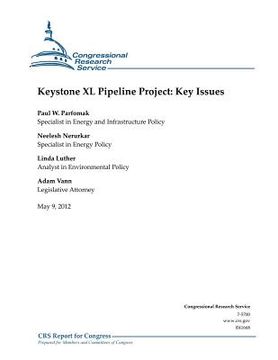Reseña del libro "Keystone XL Pipeline Project: Key Issues (en Inglés)"
In 2008, Canadian pipeline company TransCanada filed an application with the U.S. Department of State to build the Keystone XL pipeline, which would transport crude oil from the oil sands region of Alberta, Canada, to refineries on the U.S. Gulf Coast. Keystone XL would ultimately have the capacity to transport 830,000 barrels per day, delivering crude oil to the market hub at Cushing, OK, and further to points in Texas. TransCanada plans to build a pipeline spur so that oil from the Bakken formation in Montana and North Dakota can also be carried on Keystone XL. As a facility connecting the United States with a foreign country, the pipeline requires a Presidential Permit from the State Department. In evaluating such a permit application, the department must determine whether it is in the "national interest," considering the project's potential effects on the environment, economy, energy security, foreign policy, and other factors. Environmental impacts are considered pursuant to the National Environmental Policy Act, and documented by the State Department in an Environmental Impact Statement (EIS). The final EIS was released for the Keystone XL pipeline permit application in August 2011, after which a 90-day public review period began to make the national interest determination. During that time the State Department determined that more information was needed to consider an alternative pipeline route avoiding the environmentally sensitive Sand Hills region of Nebraska, an extensive sand dune formation with highly porous soil and a shallow depth to groundwater recharging the Ogallala aquifer. The Temporary Payroll Tax Cut Continuation Act of 2011 (P.L. 112-78) required the Secretary of State to approve or deny the project within 60 days. On January 18, 2012, the State Department, with the President's consent, denied the Keystone XL permit, citing insufficient time under this deadline to properly assess the reconfigured project. Subsequently, TransCanada announced that it would proceed with development of the pipeline segment connecting Cushing, OK, to the Gulf Coast as a stand-alone project not requiring a Presidential Permit-a decision supported by the Obama administration. In April 2012, TransCanada submitted to Nebraska proposed pipeline routes avoiding the Sand Hills. Subsequently, on May 4, 2012, TransCanada submitted a new application for a Presidential Permit that includes proposed new routes through Nebraska. With the new permit application, the NEPA compliance process begins anew, although it may draw from relevant existing analysis and documentation prepared for the August 2011 final EIS. In the wake of the State Department's denial of the Presidential Permit, Congress has debated legislative options addressing the Keystone XL pipeline. The Surface Transportation Extension Act of 2012, Part II (H.R. 4348) and the North American Energy Access Act (H.R. 3548) would transfer the permitting authority for the Keystone XL pipeline project to the Federal Energy Regulatory Commission, requiring FERC to issue a permit within 30 days of enactment. The Keystone For a Secure Tomorrow Act (H.R. 3811), the Grow America Act of 2012 (S. 2199), S. 2041 (a bill to approve the Keystone XL pipeline), the EXPAND Act (H.R. 4301), and the Energizing America through Employment Act (H.R. 4000) would immediately approve the original permit application filed by TransCanada.

